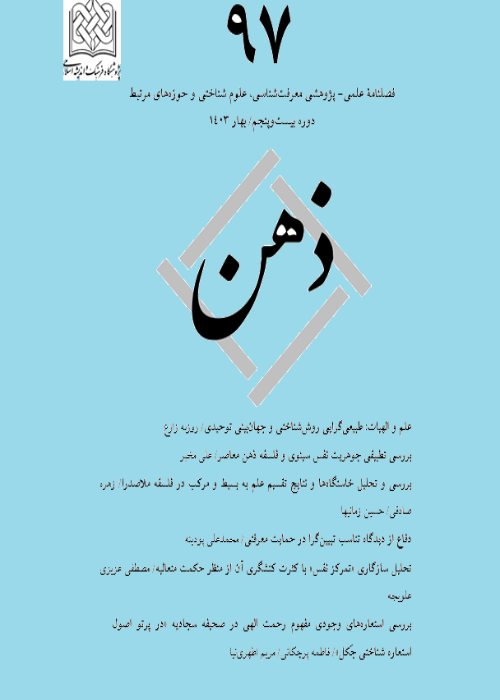فهرست مطالب

فصلنامه ذهن
سال دوازدهم شماره 2 (پیاپی 46، تابستان 1390)
- 198 صفحه، بهای روی جلد: 30,000ريال
- تاریخ انتشار: 1390/05/25
- تعداد عناوین: 7
-
صفحه 31
-
صفحه 143
-
Page 5The aim in this paper is to analysis Sara Worley and Jessica Wilson's accounts about the conception of the term 'physical'. Worley's account is based op on on some information about how children form concepts. She suggests we are hard-wired to form a concept of intentional agency from a very young age, and so there’s some reason to believe that our concept of the physical does include, as part of its content, a contrast with the mental. But, Wilson defends an account according to witch fundamental physics and the NFM (no fundamental mentality) constraints are appropriate for characterizing the physical, especially for purposes of formulating physicalism. I want to show that these accounts, each one in respect to particular aspects, cannot play the given role in formulation the thesis of physicalism.Keywords: Via Negativa, Physicalism, Physical, NFM constraint, Developmental psychology
-
Page 31It is well-known that according to philosophers, sense perception is an acquired one. From among great philosophers, however, Shaykh Ishraq opposes this idea. Also, some contemporary philosophers have tried to show that sense perception is some sort of knowledge by presence. The author believes that sense perception is a knowledge by presence; in this article, however, its being by presence has been interpreted in a way slightly different from the way other researchers interpret it. In the beginning, man's knowledge of his own body has been discussed, and the author has tried to show that just in the same way that the soul is known for us through knowledge by presence; and then, he shows that the material beings also may have knowledge and be subject of knowledge by presence. When these two premises are proved, that the sense perception is by presence (in the sense discussed in this article) may be explained.Keywords: knowledge, knowledge by presence, acquired knowledge, sense, body, material things, sense perception
-
Page 53Eliminativism is the view that mental-state terms have no reference and thus, there are no such things as mental states. According to this view, folk psychology which exploits mental states such as belief and desire in explaining behavior, is a false theory and should be replace by the scientific psychology which employs neural states and events instead of the mental. In the present paper, I will formulate the view, and introduce arguments for and against it.Keywords: eliminativism, mental states, folk psychology, instrumentalism, intentional stance
-
Page 73Transcendental Idealism is the foundation of kant’s philosophical system. According to this view space and time are two subjective forme of man. Kant for explaining his view not only gives a new grasp of space and time concept, but uses proper terminology and give them new senses. Appearance, phenomenon, gegenstand, object and synthesis are just some of the expressions. Transcendental idealism is opposed to material and empirical idealism. In the article I have endeavoured both explain the transcendental idealism and criticize principles and arguments kant uses to make and demonstrate that view. In this way, In can show that kant’s view necessarily leading to relativism and skepticism in knowledge.Keywords: Transcendental idealism, Appearance, Phenomenon, Gegenstand, Objekt
-
Page 101In psychology, Mulla Sadra's initiatives have changed forms and contents of many issues. Nevertheless, in some issues, he has followed the predecessors; and, this has caused some ambiguity in interpreting some Sadra's ideas. The main question in this study is: "Is Mulla Sadra's approach to the problem of "soul-body" a monist one or a dualist one? If it is monist, may it be reconciled with his dualist approach adopted in some other cases? In the present article, three approaches have been identified on the basis of Sadra's writings and principles: 1- an approach in which Mulla Sadra accepts duality between the soul and body; 2- a view according to which he believes in unity of the soul and body; and 3- an approach in which he thinks that the soul is the same as body. In the present article, the author has tried to prove that Mulla Sadra's view is based on gradated unity; and there is no inconsistence between duality and unity of the soul and body. Then arguments posed by Sadra to prove unity of the soul and body and that the two are the same have been discussed and it has been maintained that some of his arguments do not prove his claim.Keywords: monism, dualism, soul, body, sameness, unity
-
Page 121The central aim this paper is investigating the most important proof that kant has proposed against the Cartesian skeptic. According to his proposed proof,we not only have immediate outer experience of outer things but also even inner experience,which for Dascartes is indubtaible, is possible only on the assumption of outer experience. This proof is based on the assumption that we have two kinds of knowledge of the self,mere consciousness of one's existence and its genuine determination which depends on its relation with something,while bound up with my existence, is outside me. Effort has been made in this paper to show that despite the emphasis of commentators on the claim that his discussion on refutation of Idealism is the same discussion of unity of consciousness which is introduced in transcendental deduction, his aim and components his discussion on refutation of Idealism is distinct from the discussion transcendental deduction in some aspects. This distinction rests on a contrast between two notions of "unity ofconsciousness''and "personal Identity."Keywords: Determination of time, self consciousness, self knowledge, unity of consciousness, personal Identity, self identity
-
Page 143In the present writing, the authors go to discuss various interpretations of the concept of free play in Critique of Judgment. On the one hand, this concept plays an important role in the Critique (since the judgment of taste is based on it for its validity), on the other hand, however, Kant's explanation of this concept is not so consistent with his fundamental principles in Critique of Pure Reason. This inconsistence is caused by the fact that Kant bases judgment of taste on the free play of cognitive faculties as some mental state which is founded on no determinate notion of the object; and, at the same time, he considers a universal validity for it. But, according to the principles posed in the first Critique, universal validity of a judgment is based on its objectivity; and the basis for objectivity of a judgment is a concept of the object on which is founded the judgment. Guyer classifies attempts made to solve this problem under two precognitive and multicognitive approaches, and introduces the metacognitive approach. According to the precognitive approach, free play of faculties is the pre-condition for each and every cognition. The problem with this approach is that [in this way] every judgment will be a judgment of taste. On the basis of multicognitive approach, free play of the mental faculties will, finally, attain one concept from among some existing concepts. This interpretation is not consistent with Kant's points concerning non-inclusivity of the concept. Finally, Guyer introduces metacognitive interpretation which skips the problem instead of solving it.Keywords: free play, harmony of faculties, precognitive approach, multicognitive approach, metacognitive approach, universal validity, universal communicability


